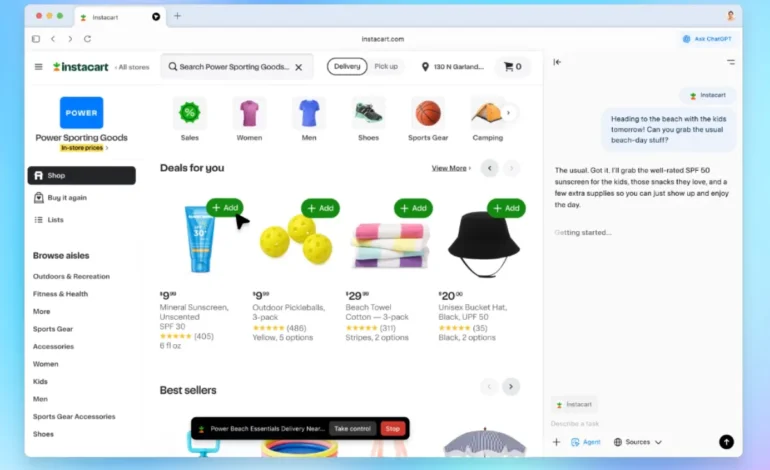OpenAI Launches ChatGPT Atlas, Its New AI-Powered Web Browser

Table of Contents
OpenAI has once again changed the way people browse the internet by launching ChatGPT Atlas, a bold new browser powered by artificial intelligence. With this launch, OpenAI is moving beyond traditional chatbot experiences, delivering a seamless, interactive, and highly personalized browsing platform.
What Is ChatGPT Atlas?
ChatGPT Atlas is OpenAI’s latest innovation, targeting everyone who wants smarter, faster, and friendlier web navigation. Unlike regular browsers, Atlas has ChatGPT embedded at its core. This means users can interact with websites, search, and even complete tasks without switching tabs or copying information.
Atlas is available first on macOS. OpenAI plans to release versions for Windows, iOS, and Android soon. Users worldwide can experience AI-driven browsing, making Atlas a global platform for both casual and professional web users.
Why Is ChatGPT Atlas Special?
Conversational Browsing with ChatGPT Atlas
Atlas lets users chat directly with any webpage. No more searching for help or copying and pasting data. With Atlas, ChatGPT acts as a super-assistant, answering questions, summarizing pages, and handling complex workflows.
Key features include:
- Chat sidebar always visible while browsing
- Instant answers about displayed content
- Page summaries, product comparisons, and code editing
Atlas keeps Google Chrome and Apple Safari on their toes, promising a web experience that is truly interactive, not just clickable.
Built-In AI Agent That Gets Things Done
With Atlas, OpenAI introduces an Operator Agent that takes action right inside the browser. Want to book a table, fill out a form, or order groceries online? Simply tell ChatGPT, and let Atlas do the work.
This automation goes beyond basic tasks. The agent can:
- Summarize emails, Slack messages, or GitHub repositories immediately
- Fill forms and make reservations with a voice command
- Manage tabs and bookmarks with natural language
Automation and smart browsing together mean less hassle for users and more productive time online.
Smarter Memory and Personalization
Memory That Remembers Your Needs
ChatGPT Atlas tracks your web activity, so it can remember what you like and help with future tasks. If you look up gluten-free recipes, Atlas will remember and use that information next time you ask for nutrition tips or food planning.
Atlas’s personalized memory enhances user experience by:
- Remembering page visits and search history
- Giving tailored recommendations
- Helping build shopping lists or travel plans based on your preferences
OpenAI stresses privacy, giving users control over what Atlas retains and remembers about browsing sessions.
Seamless Integration and User-Friendly Design
Atlas delivers all traditional browser features—tabs, bookmarks, autofill, and password management—through a clean, familiar interface. Users who have tried Chrome or Safari can transition to Atlas easily.
A unique split-screen design lets users see the webpage and ChatGPT chat at the same time. Quick access tabs show traditional search results, images, and videos. For those juggling many tabs, Atlas helps to organize and clean up with a single request.
User feedback has highlighted Atlas’s intuitive design and power, especially for people who spend time switching between work, research, and learning tasks.
How Does Atlas Challenge the Big Browsers?
Atlas takes direct aim at the dominance of Chrome and Safari. The addition of AI-powered features, seamless chat integration, and personalization gives OpenAI a strong edge. With Chrome recently adding Gemini and Safari lagging behind in AI features, Atlas delivers what many users have been waiting for—a browser that truly understands what they need.
Technology analysts and users alike see Atlas as a possible “Chrome killer.” Its launch has sparked discussions on forums like Reddit and social platforms such as X, where users are asking about privacy, sharing excitement, and wanting more features for Windows and Android.
Social Signals and Community Buzz
On X (formerly Twitter), OpenAI’s CEO Sam Altman teased Atlas’s release with sneak peek videos and livestreams. The response was immediate, with hashtags like #ChatGPTAtlas and #OpenAIBrowser trending. Users have shared experiences, suggestions, and first impressions.
Community feedback on Reddit reflects excitement, but also urges OpenAI to expand support to more platforms. Many wish for better privacy controls and broader language support. Early testers have praised Atlas for boosting productivity and making online research easier.
Key Benefits – ChatGPT Atlas at a Glance
| Feature | Benefit |
|---|---|
| Embedded ChatGPT | Interactive, immediate help |
| Operator Agent | Automates web tasks |
| Personalized Memory | Remembers user needs |
| Familiar Interface | Easy, smooth transition |
| Multi-platform Planned | Global accessibility |
| Privacy Controls | User managed data and memories |
| Productivity Focus | Less friction, more results |
Atlas offers a blend of smart technology and human-centric design, ensuring that users find value at every step.
Final Thoughts: Why OpenAI and ChatGPT Atlas Matter
OpenAI is creating a new era of browsing where ChatGPT Atlas lets everyone use the web more efficiently and interactively. The browser combines intelligent help, flawless automation, and personal memory in a package designed for users at every level. OpenAI’s focus on safety, reliability, and convenience will drive Atlas to the top of digital experiences.
With OpenAI setting new standards and ChatGPT Atlas changing the way we use the internet, browsing becomes smarter, easier, and more personal. Early signals from tech experts and users worldwide show that Atlas is set to disrupt the browser market, helping people achieve their online goals like never before.




